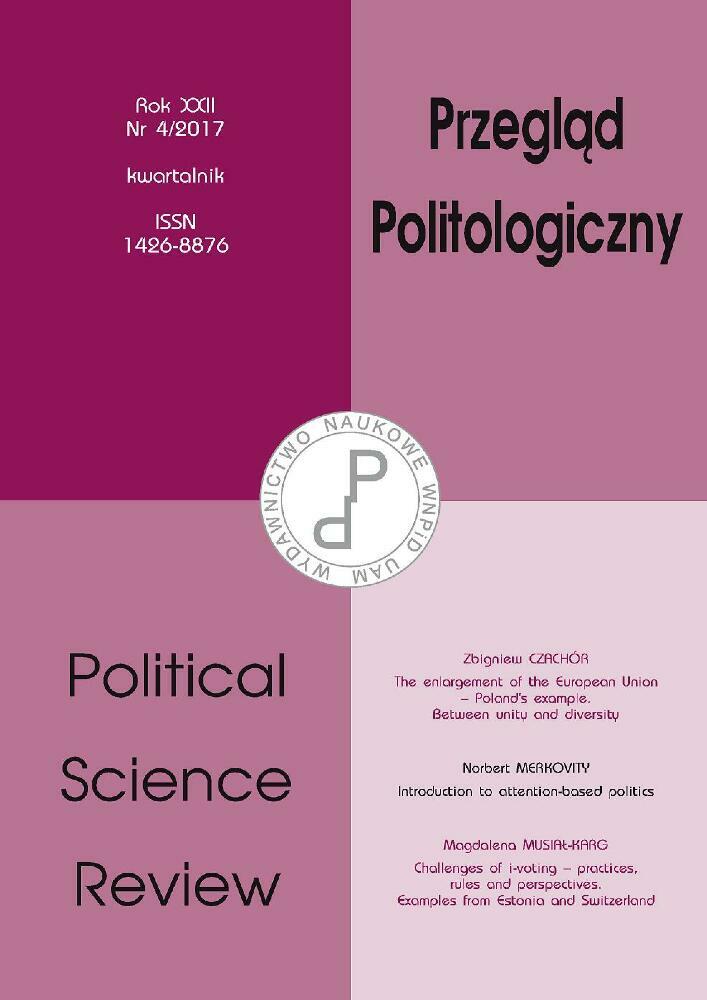Abstract
Badanie wykorzystuje metodę analizy źródeł opierającą się na jakościowej analizie komparatystycznej wystąpień prezydenta Rosji Władimira Putina podczas dorocznych konferencji prasowych. Jego celem jest rozwiązanie problemów badawczych: jak zmieniała się gnoza polityczna w przemówieniach Putina w latach 2014–2016 podczas kolejnych konferencji? Jak Putin wyzwalał potencjał performatywny z niegnostycznych elementów dyskursu po to, żeby wzmocnić gnozę polityczną? W wyniku analizy określono jakościową zmianę polegającą na przejściu od autorytarnej do totalitarnej i demokratycznej gnozy politycznej, a także ustalono wystąpienie umiarkowanego stopnia nasilenia elementów gnostycznych. Artykuł formułuje narzędzia do pomiaru typów i natężenia gnozy politycznej oraz rozróżniania diagnozy politycznej od gnozy, które są ważne dla badań z zakresu socjologii polityki i testuje ich empiryczną efektywność.
References
Barceló J. (2017), National Personality Traits and Regime Type: A Cross-National Study of 47 Countries, “Journal of Cross-Cultural Psychology”, vol. 48, no. 2.
Bäcker R. (2016), Kategorie teoretyczne totalitaryzmu a badania empiryczne, “Studia nad Autorytaryzmem i Totalitaryzmem”, vol. 38, no. 2.
Colgan J. D., Lucas E. R. (2017), Revolutionary Pathways: Leaders and the International Impacts of Domestic Revolutions, “International Interactions: Empirical and Theoretical Research in International Relations”, vol. 43, no. 3.
Dyson S. B., Parent M. J. (2017), The operational code approach to profiling political leaders: understanding Vladimir Putin, “Intelligence and National Security”, Published online: 11.04.2017.
Fagerholm A. (2016), Ideology: A proposal for a conceptual typology, “Social Science Information”, vol. 55, no. 2.
Heydari A., Davoudi I., Teymoori A. (2011), Revising the assessment of feeling of anomie: Presenting a multidimensional scale, “Procedia – Social and Behavioral Sciences”, vol. 30.
Kolstø P. (2016), Crimea vs. Donbas: How Putin Won Russian Nationalist Support – and Lost It Again, “Slavic Review”, vol. 75, no. 3.
Martin R. (1997), Democratic Institutions, Oxford Scholarship Online. http://www.oxfordscholarship.com/view/10.1093/0198292937.001.0001/acprof-9780198292937-chapter-7, 22.07.2017.
Miley T. J. (2011), Franquism as Authoritarianism: Juan Linz and his Critics, “Politics, Religion & Ideology”, vol. 12, no. 1.
Miley T. J. (2015), Constitutional Politics and Religious Accommodation: Lessons from Spain, “Politics, Religion & Ideology”, vol. 16, no. 4.
Motimele M. (2017), Political representation and non-citizenship: the impact of excluded subjects on democratic frameworks of representation, “Representation”, Published online 10.07.2017.
Putin V. (2014), News conference of Vladimir Putin, 18.12.2014, Official Internet Resources of the President of Russia, http://en.kremlin.ru/events/president/news/copy/47250, 21.04.2017.
Putin V. (2015), Vladimir Putin’s annual news conference, 17.12.2015, Official Internet Resources of the President of Russia, http://en.kremlin.ru/events/president/news/copy/50971, 21.04.2017.
Putin V. (2016), Vladimir Putin’s annual news conference, 23.12.2016, Official Internet Resources of the President of Russia, http://en.kremlin.ru/events/president/news/copy/53573, 21.04.2017.
Roberts K. (2017), Understanding Putin: The politics of identity and geopolitics in Russian foreign policy discourse, “International Journal”, vol. 72, no. 1.
Sussex M. (2017), The triumph of Russian national security policy? Russia’s rapid rebound, “Australian Journal of International Affairs”, Published online 09.07.2017.
Voegelin E. (1987), The New Science of Politics: An Introduction, The University of Chicago Press, Chicago–London.
